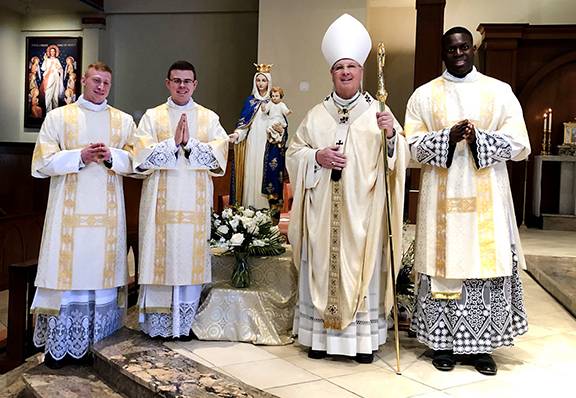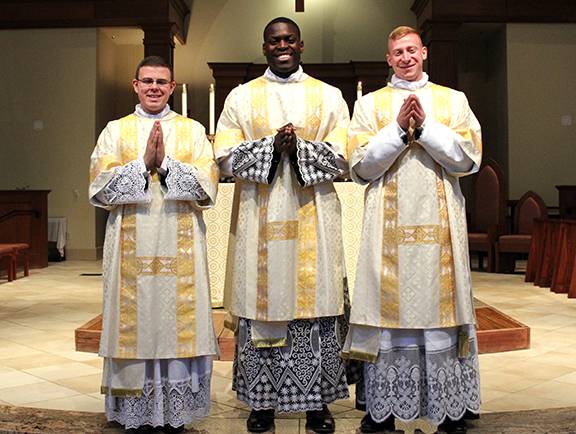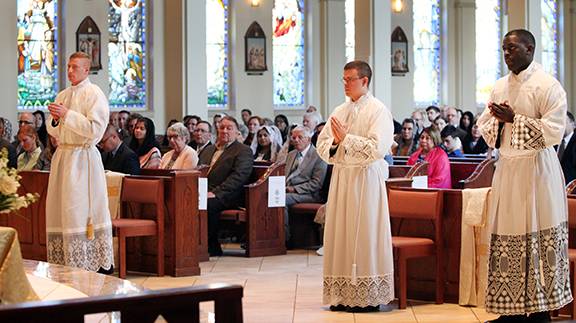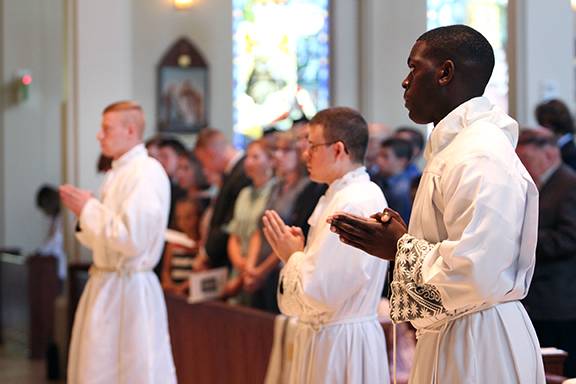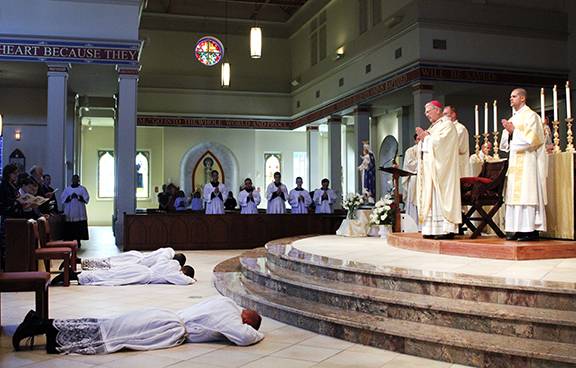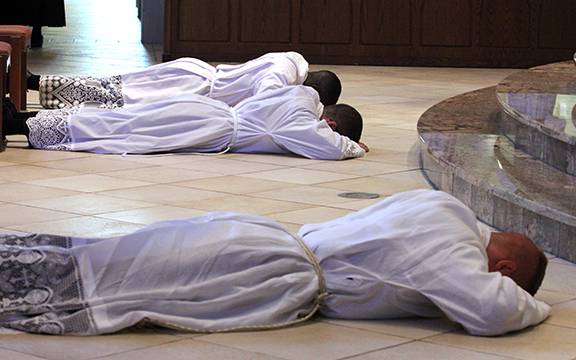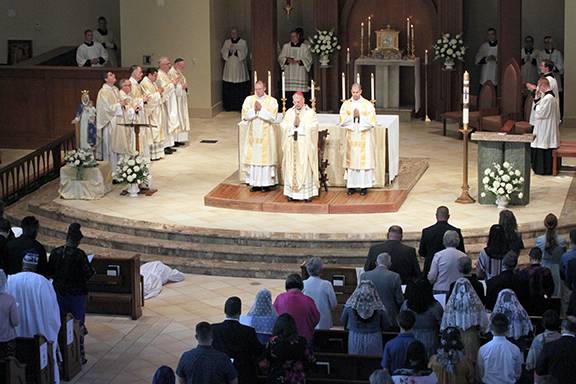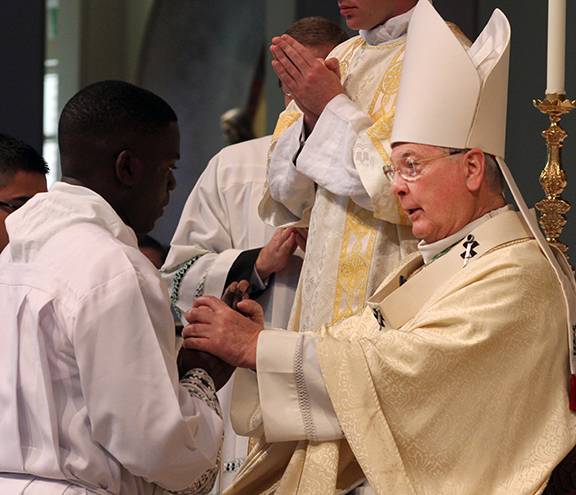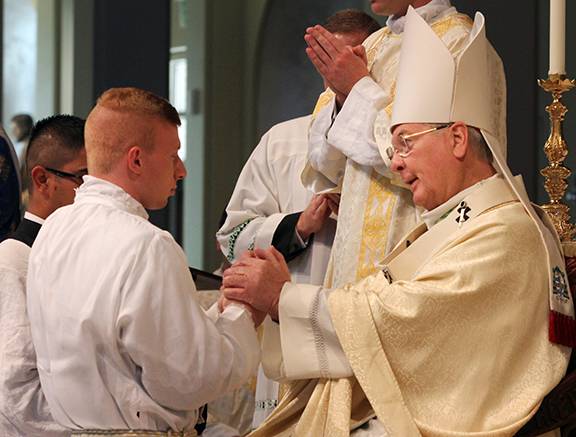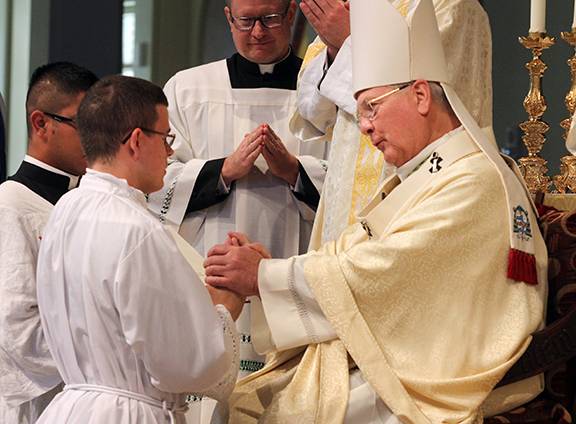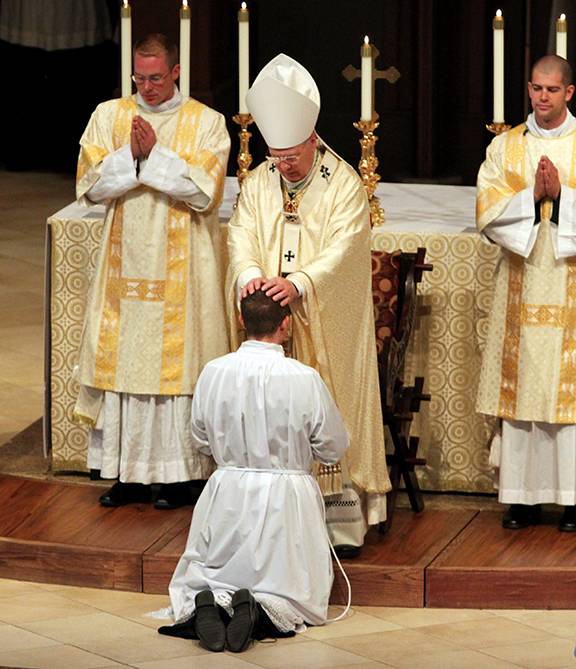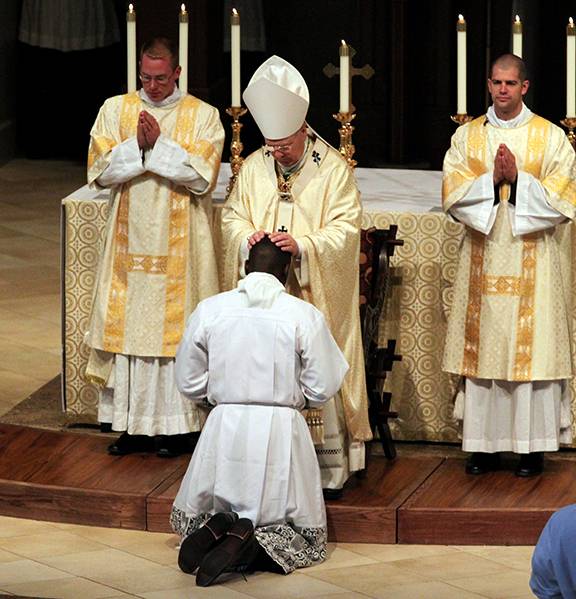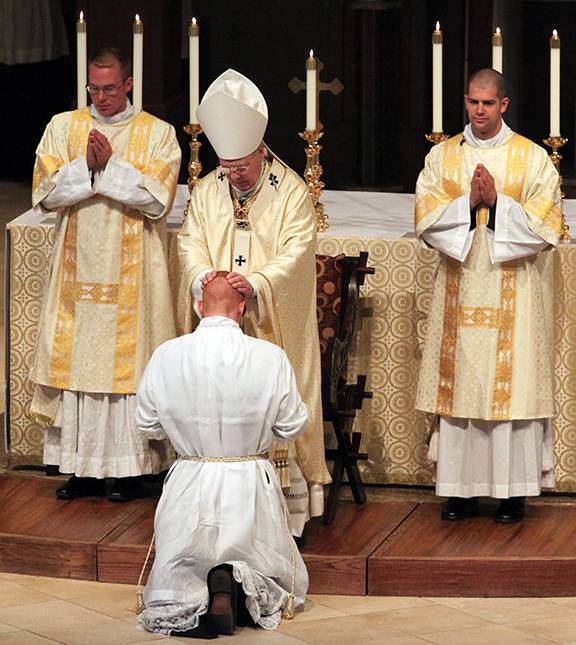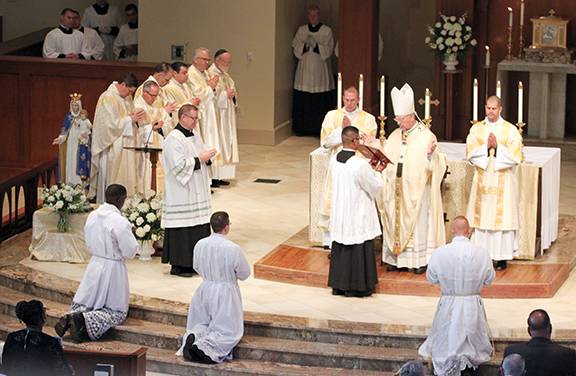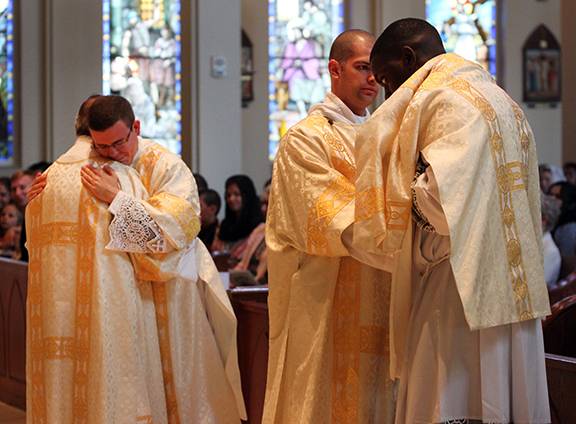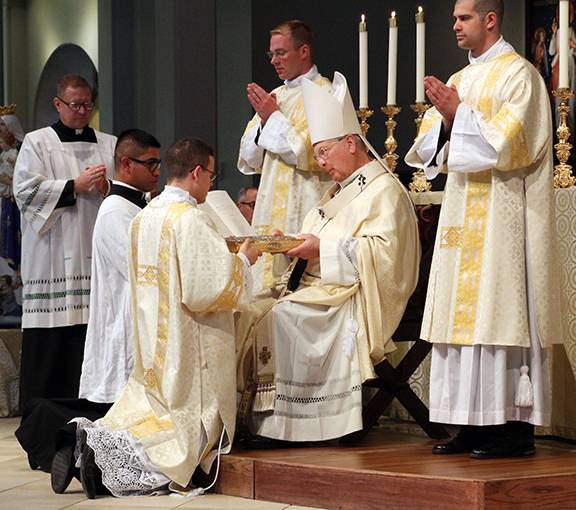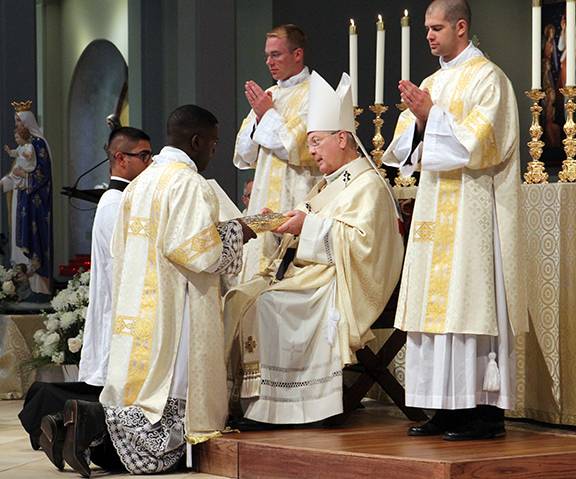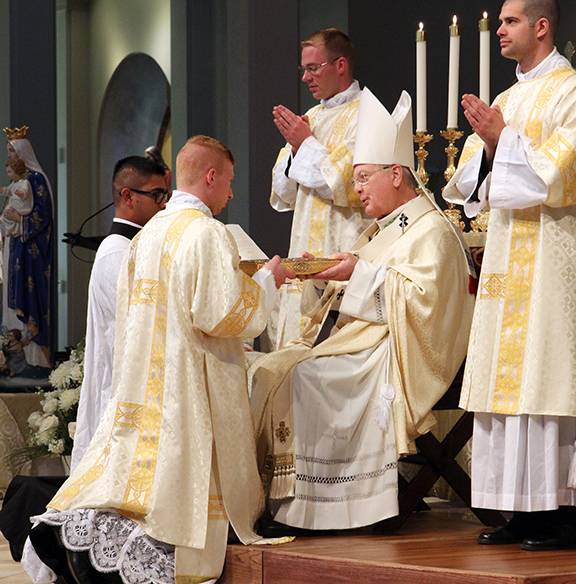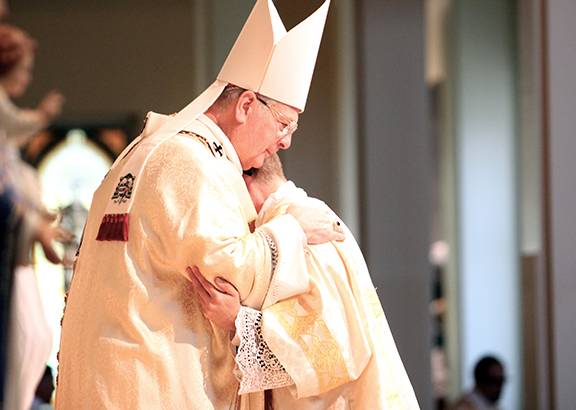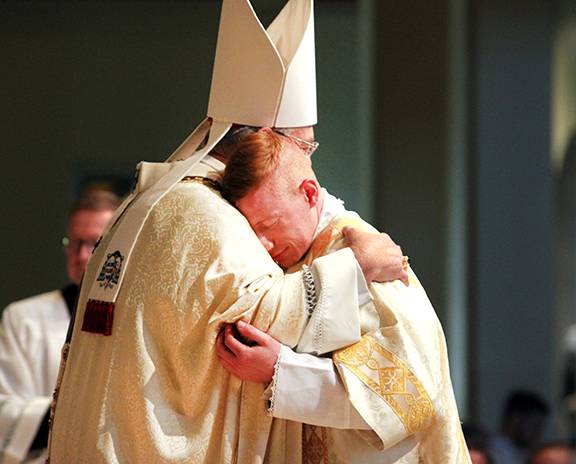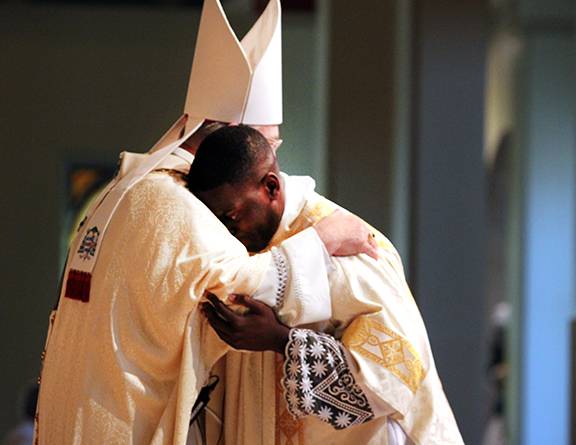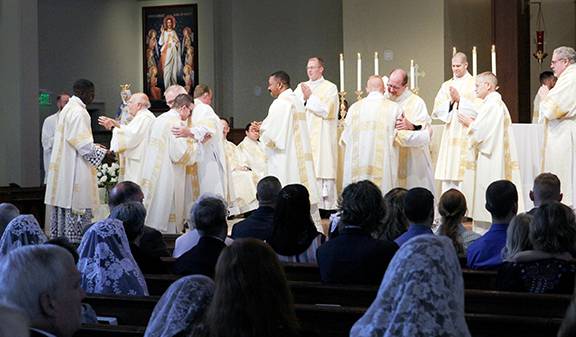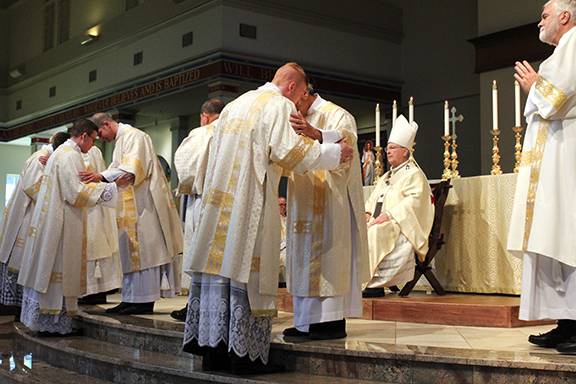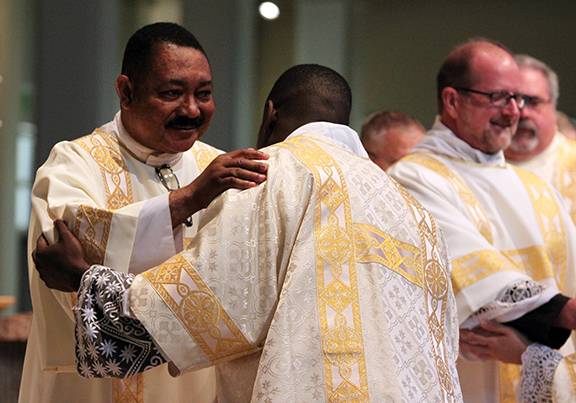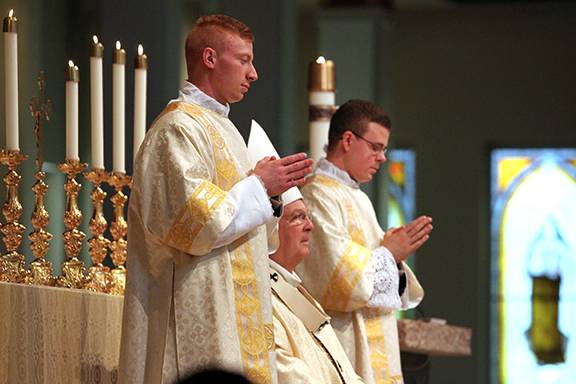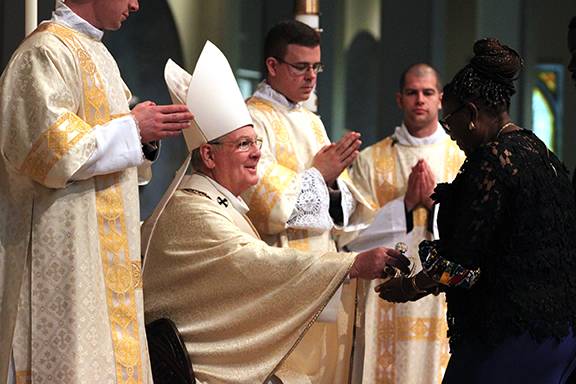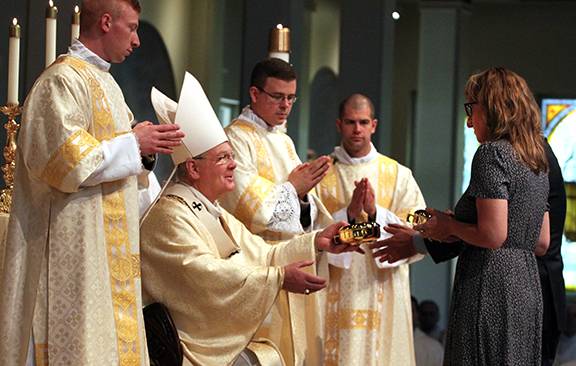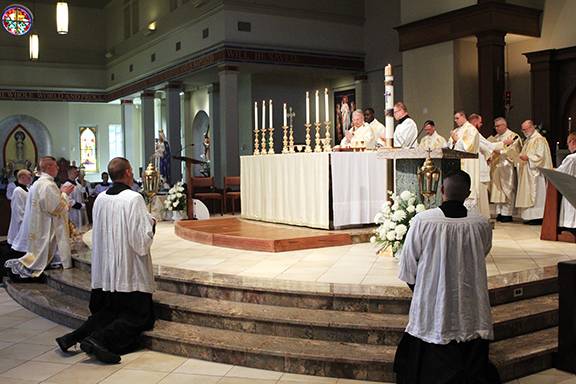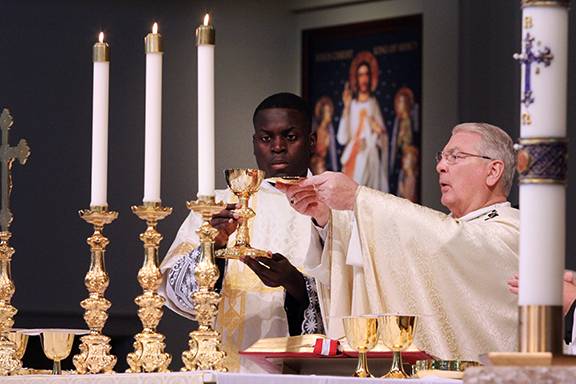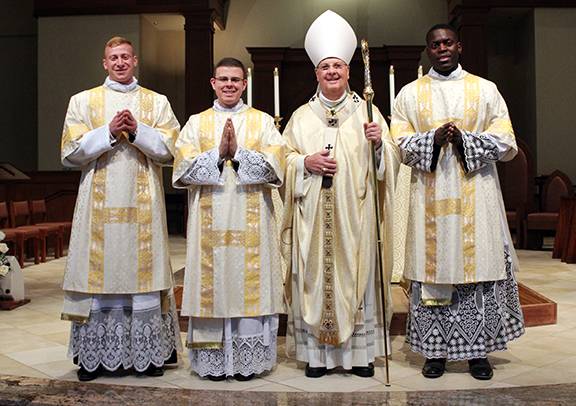 Brock, Nnebe-Agumadu and Rusciolelli ordained deacons June 4
Brock, Nnebe-Agumadu and Rusciolelli ordained deacons June 4
HUNTERSVILLE — “This is a great day for the Church of Charlotte, and for the Church Universal,” said visiting Archbishop Gregory J. Hartmayer of the Archdiocese of Atlanta during a special Mass Saturday to ordain seminarians Christopher Brock, Chinonso Nnebe-Agumadu and Peter Rusciolelli as deacons for the Diocese of Charlotte.
Archbishop Hartmayer presided over the June 4 ordination Mass at St. Mark Church in Huntersville in lieu of Bishop Peter Jugis, who is recovering from illness. During the start of the ordination rite, hundreds of people watched as the three men were called to stand before Archbishop Hartmayer at the steps of the altar and Father Christopher Gober, diocesan vocations director, attested to their preparedness for holy orders.
During the two-hour Mass, Archbishop Hartmayer delivered a homily aimed at the three men, explaining the various parts of the ordination rite and giving them advice as they begin serving God and the Church as ordained ministers.
'Enjoy your diaconate, learn from your diaconal ministry, because there’s more coming.' — Archbishop Gregory Hartmayer
“In sharing in the sacrament of orders, the deacon is authorized and empowered to order, direct and focus the attention of the people on their dignity as baptized members of the Body of Christ,” he said. “The deacon is called to help the people, and himself, to judge wisely the things of earth and measure them by the things of heaven. Our new deacons will do that not just through their preaching and teaching, but in their conduct of their lives.”
“Everything that you have done up to now in formation has been a preparation,” he told the three men. “Now there is going to be a firm commitment – that you will be a man of prayer, that you will be a man of service, that you will shape your life after the life of Christ Himself. There’s no longer an option, it’s a commitment.”
Through their promises of celibacy and obedience, Archbisop Hartmayer explained, the men demonstrate their "total gift of self to God and His people” and to their “wholehearted faith and trust” in God.
Becoming a deacon means embracing a life of service, he continued.
“It takes some time and some discernment in our life as a deacon to understand what it means to serve,” he said. He encouraged them to proclaim the Gospel through their words and through their lives, remaining grounded in the truth found in the scriptures as they minister to others.
“These are the commitments that you are making today. They are the foundation for more,” he told them. “So enjoy your diaconate, learn from your diaconal ministry, because there’s more coming. And unless you build a sound foundation as deacons, the burdens ahead, the will of God ahead, will become even more difficult to carry, if the foundation you are forming now as ordained deacons is not sturdy and solid.”
During the ordination rite, the men arose and, one by one, approached the archbishop. He laid hands on each man’s head and prayed the prayer of ordination over them, thus consecrating them as deacons. The laying on of hands, the archbishop noted, “links you to the teaching and the ministry of the Apostles.”
The men then lay prostrate before the altar – “a gesture of abandonment and trust,” Archbishop Hartmayer described it.
“That prostration is a gesture of self-emptying and a sign of humility, which must be a sign of your diaconal ministry,” he told the men. “It is more than a symbol. It’s a sign that leads to the kind of life and commitment you are making – a humble commitment, a trusting commitment. And you cannot put yourself in God’s trust unless you empty yourself and leave room for Him.”
The newly-ordained deacons were then vested with a stole – symbolizing the deacon’s office of service – and the dalmatic, the outer garment used in the liturgy.
Deacon Christopher Brock was vested by Deacon Ruben Tamayo of his home parish of St. Vincent de Paul Church in Charlotte. Before Mass, Deacon Brock explained that he has asked Deacon Tamayo “because he was very supportive of me as I discerned the possibility of a vocation to the priesthood, and he often encouraged me to consider going to seminary, even when I through a period of running away from the call. He played an important role in my discernment overall, and I thought having him vest me would be a beautiful way to say thank you.”
Deacon Chinonso Nnebe-Agumadu was vested by transitional Deacon Darren Balkey of Sacred Heart Church in Salisbury. Before Mass, he said, “I chose him because he has been a good friend of mine since I entered seminary, and he has been an exemplary figure in his prayer life, care for his brother seminarians, and care for souls.”
Deacon Peter Rusciolelli was vested by Deacon Carlos Medina of his home parish of St. Patrick Cathedral. He said he asked Deacon Medina “because I have grown up serving with him at the cathedral my whole life. He was probably the first deacon I even knew.”
The newly-vested deacons then again approached the sanctuary one by one, receiving the Book of the Gospels from Archbishop Hartmayer and an acknowledgment from him, welcoming them to their new role in the Church.
The three deacons will now be able to proclaim the Gospel at Mass, preach at the invitation of the priest, prepare the altar for the sacrifice of the Eucharist, distribute the Lord’s Body and Blood to the faithful, administer baptisms, officiate at marriages, bring Viaticum to the dying, conduct funeral rites, instruct believers and nonbelievers in Church doctrine, preside over public prayer and perform works of charity.
The men are considered "transitional" deacons as compared to "permanent" deacons – a reflection that they intend to serve a year in pastoral, liturgical and educational preparation before they are considered for ordination to the priesthood in 2023. Deacons are the first of three types of holy orders; the other two are priest and bishop.
Deacon Brock will serve his summer assignment at St. Thomas Aquinas Church in Charlotte. Deacon Nnebe-Agumadu will serve his summer assignment at St. Mark Church in Huntersville. Deacon Rusciolelli will serve his summer assignment at St. Ann Church in Charlotte.
— SueAnn Howell, senior reporter. Photos by SueAnn Howell, James Sarkis and Patricia Guilfoyle.
Deacon Christopher Brock: ‘A deep sense of gratitude’ about being called to serve
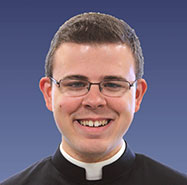 Home parish: St. Vincent de Paul Church, Charlotte
Home parish: St. Vincent de Paul Church, Charlotte
Birthplace: Woodstock, Va.
Birthday: Jan. 11, 1997
Raised in: Charlotte, N.C.
Family: Parents – Stephen and Susan Brock; siblings - Mary, Michael, Isaac, Sebastian, Felicity, Peter, Timothy
College: St. Joseph College Seminary
Degree: Bachelor of Arts in Philosophy, Belmont Abbey College
Theology: Mount St. Mary’s Seminary, Cincinnati, Ohio
Summer assignments in the diocese: Sacred Heart Church in Salisbury, Immaculate Conception Church in Hendersonville, Our Lady of Grace Church in Greensboro
CNH: What are some of your interests/hobbies?
Deacon Brock: Playing piano and guitar, reading
CNH: Any comments to the people of the Diocese of Charlotte about becoming a transitional deacon here?
Deacon Brock: I am very excited to begin ministry as a transitional deacon here in the Diocese of Charlotte. Being a deacon will allow me to serve the people of God in new ways, and I am looking forward to seeing how God will use me to serve His Church during my time as a deacon.
CNH: When did you first hear the call to a vocation to the priesthood?
Deacon Brock: Being a priest was something I was attracted towards ever since I was a boy. However, it was in high school that I began to really take the possibility of a vocation seriously. The Quo Vadis Days retreat( a discernment camp in the diocese), which I attended for multiple summers, played a huge role in my discernment, and being an altar server played an important role as well.
CNH: Who did you first talk to about your vocation?
Deacon Brock: I especially talked with priests at the Quo Vadis Days retreat, as well as my parents.
CNH: What type of feedback or advice did you get from them?
Deacon Brock: My parents were always very supportive of me as I discerned the possibility of a vocation to the priesthood. The priests I spoke to gave me very helpful advice to guide me in my discernment process.
CNH: How did you go about discerning where you felt called to explore your possible vocation?
Deacon Brock: Time spent in prayer, especially in Adoration of the Blessed Sacrament, was instrumental in my discernment. Asking for advice from trusted priests was also very beneficial.
CNH: Tell us about what you have been doing as part of your discernment process
Deacon Brock: The most important thing is certainly daily time spent in prayer before the Blessed Sacrament. As I move toward ordination, reflecting on my vocational journey and the way the Lord has led me throughout my whole life, and especially in seminary, gives me a deep sense of gratitude and strengthens my belief that I am indeed called to serve as a priest.
CNH: What advice do you have for a young man discerning a call to the priesthood?
Deacon Brock: I would say that the most beneficial thing you can do is to deepen your relationship with Jesus Christ as much as possible. Time spent in prayer, especially in Eucharistic Adoration, is incredibly helpful. Also, do not be afraid to reach out to a trusted priest for advice.
CNH: What do you think has helped you the most to discern God’s will for your vocation?
Deacon Brock: Consistent time spent in prayer has certainly been the most helpful thing. I also think that spending time serving in a parish, whenever possible, is a great way to discern. I have generally found a great deal of peace and joy when I am in a parish setting, and this strengthens my belief that I am called to the priesthood.
Deacon Chinonso Nnebe-Agumadu: ‘If priesthood is what I am called to do, then God's got me’
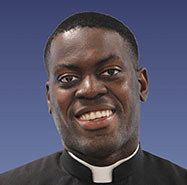 Home parish: St. Thomas Aquinas Church, Charlotte
Home parish: St. Thomas Aquinas Church, Charlotte
Birthplace: Washington, D.C.
Birthday: Oct. 24, 1995
Raised in: Charlotte, N.C.
Family: Parents - Samuel Nnebe-Agumadu (deceased) and Uche Nnebe-Agumadu; siblings - Arize, Ijeamaka, Munachi, Tobenna, Chukwuma
College: North Carolina A&T State University
Degree: Bachelor of Science in Biology
Pre-Theology: Pontifical College Josephinum, Columbus Ohio
Theology: Mount St. Mary’s Seminary, Cincinnati, Ohio
Summer assignments in the diocese: St. Ann Church in Charlotte, Sacred Heart Church in Salisbury, St. Therese Church in Mooresville and St. Mark Church in Huntersville.
CNH: What are some of your interests/hobbies?
Deacon Nnebe-Agumadu: I like to read, play soccer, and bake.
CNH: Any comments to the people of the Diocese of Charlotte about becoming a transitional deacon here?
Deacon Nnebe-Agumadu: I am really excited about becoming a transitional deacon here in the Diocese of Charlotte. I recall my first day in seminary, when I recognized that this new journey would be different from any other thing I had done. So it is with becoming a transitional deacon. I am excited to make the different promises to the bishop, and also to proclaim the Gospel to the faithful people of this diocese who have been so kind and generous with me. It is a new way of life for sure, but I am happy with the formation and training I have received from this diocese to help me to be a good and faithful deacon.
CNH: When did you first hear the call to a vocation to the priesthood?
Deacon Nnebe-Agumadu: I believe the first time I considered a vocation to the priesthood was when I was in fourth grade, the same year I received my first Holy Communion. I think that was also the year I became an altar server, and I remember that I was always excited to see what the priest was doing at Mass.
It was however the summer before my senior year in high school that I had a profound experience that really got me to take the thought of being a priest more seriously.
CNH: Who did you first talk to about your vocation?
Deacon Nnebe-Agumadu: I talked to my parents and siblings first about my vocation. I also think I told everyone, if I am being honest. I can remember a lot of my extended family members calling me “Father Nonso” at such a young age. I probably told a couple of priests then, but I can’t remember what they told me then. Fast forward to senior year of high school when I really considered the vocation, I told Father Frank Cancro, who was my pastor at that time at Queen of the Apostles Parish in Belmont.
CNH: What type of feedback or advice did you get from them?
Deacon Nnebe-Agumadu: Overall I got positive feedback from all whom I informed. They prayed for me and encouraged me to spend time in prayer. My dad was the one who first encouraged me to spend time with Our Lord in Eucharistic Adoration.
I was pretty young when I told them I was considering a vocation, but their reaction was always supportive. My parents and siblings had the mindset of doing whatever they could to help me discern properly. When certain things did not work out, they would always encourage me to trust in God’s plan. Father Frank always encouraged me to develop a strong prayer life, and he was willing to put me in positions to be of service to the Church. He actually encouraged me to wait until I was finished with college before applying to seminary, and I am glad that he did, because there was a lot of maturing that took place for me in college.
CNH: How did you go about discerning where you felt called to explore your possible vocation?
Deacon Nnebe-Agumadu: I started to pray more, the rosary especially, and while I was in college, I started going to Mass more times during the week and spending more time in Eucharistic Adoration.
I originally was interested with discerning with the Society of Jesus (the Jesuits), but it did not work out after I had a couple of phone calls with them. I had first considered them because of their influence in my dad’s life, and probably because they were the priests I had heard the most about. But after reflecting on my life, I realized that the priests who had influenced me the most were diocesan priests. So after some prayer and guidance, I thought it worthwhile to consider them. Providentially in the same year the plan with the Jesuits did not work out, Father Marcel Amadi became my campus minister in college, and he was of huge help to me then.
CNH: How and when did you reach out to the Vocations Office at the diocese?
Deacon Nnebe-Agumadu: I believe I reached out to the vocations office after attending Quo Vadis Days (a discernment camp in the diocese) in the summer of 2015. I have Father James Duong of St. Benedict Church to thank for introducing me to camp. After such a good experience at Quo Vadis Days, I contacted Father Christopher Gober (diocesan vocations director) to inform him that I was considering the priesthood.
CNH: Tell us about what you have been doing as part of your discernment process.
Deacon Nnebe-Agumadu: One of the things I have tried to do is a daily Holy Hour. Particularly, I always like to start my day with a Holy Hour, to sanctify the day. I consider Mary very influential in my vocation, so I like to say the rosary every day, and offer myself to her every morning and evening.
Spiritual reading has also been important for me. I like reading and meditating on the works of the saints, so that by their very example and wisdom, I may learn to grow closer to the Lord.
CNH: What advice do you have for a young man discerning a call to the priesthood?
Deacon Nnebe-Agumadu: Do not be afraid of the call! Do not run away from it! Do not be afraid to bring your worries and anxieties to God in prayer. Let Christ, Mary and the saints be your friends at this time. Go to Mass frequently, spend time with the Lord in Eucharistic Adoration, say the rosary and seek the saints’ intercession, particularly your confirmation saint. I was once told that “you don’t choose your confirmation saint, your confirmation saint chooses you.” This advice has helped me in my vocation and has drawn me closer to my confirmation saint, St. Ildephonsus. Never be afraid to empty yourself so as to make room for the will of God in your life.
CNH: What do you think has helped you the most to discern God’s will for your vocation?
Deacon Nnebe-Agumadu: Spiritual direction for sure. I am very thankful for the priests I have had as spiritual directors who have been there to guide and direct me especially in moments of difficulty.
Our Blessed Mother has also been a big help. She has brought me such joy and peace through praying the rosary and through her many intercessions. I also have her to thank for helping to draw me closer to St. Ildephonsus, whom I now constantly seek his intercession.
Another big thing has been fraternity with brother seminarians both in the diocese and in the different seminaries I have attended. The seminary was truly the first place I experienced such fraternity that encouraged me more towards my goal.
Most importantly has been the time spent with Our Lord in prayer and in silence. You just know that the journey is worth it, when you know that the Lord loves you.
Being able to experience His love, goodness, care and compassion every day in prayer and in Mass, just confirms to me that if priesthood is what I am called to do, then God’s got me, and that is really satisfying.
Deacon Peter Rusciolelli: ‘I was always encouraged to pursue God's will for my life’
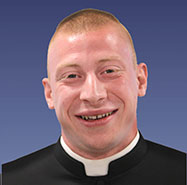 Home parish: St. Patrick Cathedral, Charlotte
Home parish: St. Patrick Cathedral, Charlotte
Birthplace: Charlotte, N.C.
Birthday: Aug. 21, 1997
Raised in: Waxhaw, N.C.
Family: Parents - William and Deborah Rusciolelli; siblings - Sister Therese Marie (formerly Molly), Nathanael, Abigail, William, John Paul, Noah, Bridget, Celeste
College: St. Joseph College Seminary
Degree: Bachelor of Arts in Philosophy, Belmont Abbey College
Theology: Mount St. Mary’s Seminary, Cincinnati, Ohio
Summer assignments in the diocese: St. Mark Church in Huntersville; St. Jude Mission in Sapphire Valley and Our Lady of the Mountains Church in Highlands; St. John the Baptist Church in Tryon, St. Ann Church in Charlotte.
CNH: What are some of your interests/hobbies?
Deacon Rusciolelli: I enjoy playing sports, outdoor activities such as hiking, fishing, hunting, camping etc., fixing and building things, reading and studying philosophy, theology and liberal arts.
CNH: Any comments to the people of the Diocese of Charlotte about becoming a transitional deacon here?
Deacon Rusciolelli: Having been born and raised in the Diocese of Charlotte, I am very excited to be ordained and to begin to serve within this diocese. During my time as a transitional deacon and future ministry as a priest, I look forward giving back to the faithful who have given me so much.
CNH: When did you first hear the call to a vocation to the priesthood?
Deacon Rusciolelli: It was gradual, in the sense that there was no one moment. I began discerning God’s will for my life when I was about 15 and by the time I was 18 I had made the decision to enter seminary.
CNH: Who did you first talk to about your vocation, and what advice did you get from them?
Deacon Rusciolelli: I spoke with my spiritual director and a friend. I was always encouraged to pursue God’s will for my life and to continue praying, particularly praying the breviary (Liturgy of the Hours).
CNH: How did you go about discerning where you felt called to explore your possible vocation?
Deacon Rusciolelli: I continued praying about my vocation, stopping at Adoration for time before the Blessed Sacrament, prayed the rosary and the breviary, talked about my concerns with my spiritual director, etc.
CNH: How and when did you reach out to the Vocations Office at the diocese?
Deacon Rusciolelli: I reached out to the Vocations Office at the diocese around Christmas time in the year of 2015. I emailed Father Christopher Gober (diocesan vocations director) and then had a subsequent meeting with him.
CNH: Tell us about what you have been doing as part of your discernment process.
Deacon Rusciolelli: I have continued my prayers and built upon them. I have meditated on the priesthood, studied it, and continued to talk about it with spiritual directors and formation advisers. I have read books on it and lived the life, as best as one is able, that a diocesan priest might be called to live.
CNH: What advice do you have for a young man discerning a call to the priesthood?
Deacon Rusciolelli: I would advise prayer and spiritual direction. One must discern God’s vocation for their life by having self-knowledge and remaining open to the will of God. Meditative prayer is necessary for this and a spiritual director can help one understand what God is saying in prayer. Also, talking with priests and seminarians about their experience, reading books on the topic, living the life and discerning whether this lifestyle brings peace and joy and the other fruits of the Holy Spirit – these are all helpful ways to discern a vocation. One must also pray for and work on obtaining a trust in God to make a decision without knowing or controlling all the outcomes.
CNH: What do you think has helped you the most to discern God’s will for your vocation?
Deacon Rusciolelli: Faithfulness and consistency in prayer.
— SueAnn Howell, senior reporter



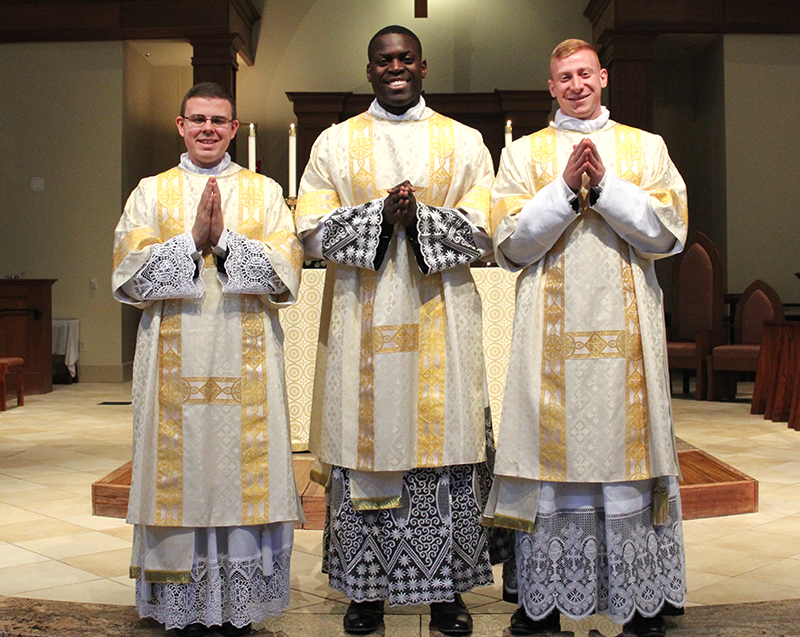 Brock, Nnebe-Agumadu and Rusciolelli ordained deacons June 4
Brock, Nnebe-Agumadu and Rusciolelli ordained deacons June 4